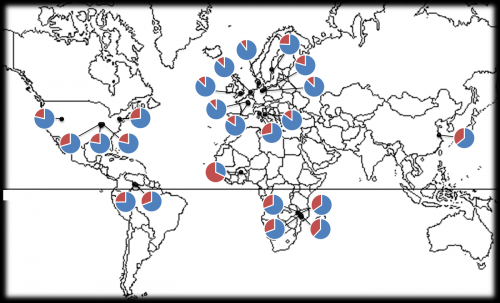February 12, 2014 report
Study shows gut bacteria associated with obesity varies by geographic latitude

(Medical Xpress)—A pair of researches has found that the proportions of two types of gut bacteria known to have an impact on weight retention differ by geographic latitude. In their paper, published in the journal Biology Letters, Taichi Suzuki and Michael Worobey of the Universities of California and Arizona respectively describe how they studied gut data of people from around the world and found that the amounts of two types of bacteria associated with weight gain or loss was different depending on where people lived.
Scientists know that animals that live in colder climates tend to be bigger than those in the warmer climates—many species that live in cold climates also have a lot of fat to help them keep warm. It's also been found that the gut bacteria in animals such as mice differ based on if they live in a warm or cold climate. In this new study, the researchers wanted to know if gut bacteria might be different for people living in warm versus cold climates as well. To find out, they accessed several medical databases that held information regarding gut bacteria from people who live in various places all over the planet—in all they studied the gut bacteria of 1,020 people from 23 different parts of the world, ranging from hot to cold. In so doing, they discovered that those who live in latitudes farther from the equator (colder places) had more of a bacteria family known as Firmicutes in their guts than did those that lived in warmer climates and less of a family known as Bacteroidetes. This is important because Firmicutes have been associated with causing an increase in body fat retention, while Bacteroidetes have been shown to have the opposite effect.
The results of their study aren't enough to suggest that living in a warm or cold climate causes changes to gut biota—it's possible after all that people eat differently because of where they live—or an increase or decrease in likelihood of retaining body fat, but it does show that there are differences and that appears to be enough to warrant further study—if only to find out if living in a colder climate means having a harder time keeping the weight off.
More information: Geographical variation of human gut microbial composition, Biol. Lett. February 2014 vol. 10 no. 2 20131037, Published 12 February 2014 doi: 10.1098/rsbl.2013.1037
Abstract
Although we know there is considerable variation in gut microbial composition within host species, little is known about how this variation is shaped and why such variation exists. In humans, obesity is associated with the relative abundance of two dominant bacterial phyla: an increase in the proportion of Firmicutes and a decrease in the proportion of Bacteroidetes. As there is evidence that humans have adapted to colder climates by increasing their body mass (e.g. Bergmann's rule), we tested whether Firmicutes increase and Bacteroidetes decrease with latitude, using 1020 healthy individuals drawn from 23 populations and six published studies. We found a positive correlation between Firmicutes and latitude and a negative correlation between Bacteroidetes and latitude. The overall pattern appears robust to sex, age and bacterial detection methods. Comparisons between African Americans and native Africans and between European Americans and native Europeans suggest no evidence of host genotype explaining the observed patterns. The variation of gut microbial composition described here is consistent with the pattern expected by Bergmann's rule. This surprising link between large-scale geography and human gut microbial composition merits further investigation.
© 2014 Medical Xpress


















